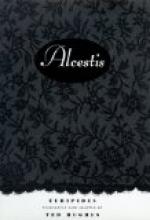P. 8, l. 82, Pelias’ daughter.]—i.e. Alcestis.
P. 8, l. 92, Paian.]—The Healer. The word survives chiefly as a cry for help and as an epithet or title of Apollo or Asclepios. “Paian,” Latin Paean, is also a cry of victory; but the relation of the two meanings is not quite made out. (Pronounce rather like “Pah-yan.”) Cf. l. 220.
P. 9, l. 112, To wander o’er leagues of land.]—You could sometimes save a sick person by appealing to an oracle, such as that of Apollo in Lycia or of Zeus Ammon in the Libyan desert; but now no sacrifice will help. Only Asclepios, were he still on earth, might have helped us. (See on the Prologue.)
P. 12, l. 150, ’Fore God she dies high-hearted.]—What impresses the Elder is the calm and deliberate way in which Alcestis faces these preparations.
P. 12, l. 162, Before the Hearth-Fire.]—Hestia, the hearth-fire, was a goddess, the Latin Vesta, and is addressed as “Mother.” It is characteristic in Alcestis to think chiefly about happy marriages for the children.
P. 12, l. 182, Happier perhaps, more true she cannot be.]—A famous line and open to parody. Cf. Aristophanes, Knights, 1251 ("Another wear this crown instead of me, Happier perhaps; worse thief he cannot be"). And see on l. 367 below.
P. 15, l. 228, Hearts have bled.]—People have committed suicide for less than this.
P. 16, l. 244, O Sun.]—Alcestis has come out to see the Sun and Sky for the last time and say good-bye to them. It is a rite or practice often mentioned in Greek poetry. Her beautiful wandering lines about Charon and his boat are the more natural because she is not dying from any disease but is being mysteriously drawn away by the Powers of Death.
P. 16, l. 252, A boat, two-oared.]—She sees Charon, the boatman who ferried the souls of the dead across the river Styx.
P. 17, l. 259, Drawing, drawing.]—The creature whom she sees drawing her to “the palaces of the dead” is certainly not Charon, who had no wings, but was like an old boatman in a peasant’s cap and sleeveless tunic; nor can he be Hades, the throned King to whose presence she must eventually go. Apparently, therefore, he must be Thanatos, whom we have just seen on the stage. He was evidently supposed to be invisible to ordinary human eyes.
P. 18, l. 280, Alcestis’s speech.]—Great simplicity and sincerity are the keynotes of this fine speech. Alcestis does not make light of her sacrifice: she enjoyed her life and values it; she wishes one of the old people had died instead; she is very earnest that Admetus shall not marry again, chiefly for the children’s sake, but possibly also from some little shadow of jealousy. A modern dramatist would express all this, if at all, by a scene or a series of scenes of conversation; Euripides always uses the long self-revealing speech. Observe how little romantic love there is in Alcestis, though Admetus is full of it. See Preface, pp. xiii, xiv.




